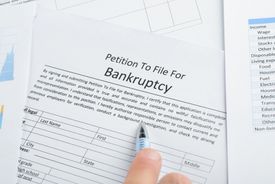What's the Difference Between Chapter 7 & 13 Bankruptcy?

Declaring bankruptcy is a tough call to make, especially since it includes significant repercussions to your personal or business finances. If you choose to file for one, know that you’re faced with two options: Chapter 7 and 13. While an attorney will help you evaluate your circumstances, here’s a closer look at how these varieties differ to help you decide which is right for you.
A Guide to Personal Bankruptcy Types
How Chapter 7 Works
Chapter 7 pertains to liquidation, wherein a bankruptcy court discharges most or all of your debts in exchange for disposing of specific, nonexempt properties through a court-appointed trustee. If you want to retain ownership of a property like real estate or vehicles, then you must pay its fair market value. This type is typically intended for individuals who don’t have enough income to cover what they owe. Chapter 7 allows for discharging of unsecured debt, giving debtors a fresh start. It also lets lenders of a secured debt claim the attached property, so you must forfeit it to erase your obligations. Unfortunately, under Chapter 7, there’s no way to catch up on missed payments to avoid foreclosure or repossession.
How Chapter 13 Works
 Chapter 13, on the other hand, refers to debt reorganization. It applies to debtors with remaining income that can be used to settle a portion of their balances through a court-mandated repayment plan. By restructuring both secured and unsecured balances according to disposable income, debts, and assets, you will have a reasonable time frame to pay off everything.
Chapter 13, on the other hand, refers to debt reorganization. It applies to debtors with remaining income that can be used to settle a portion of their balances through a court-mandated repayment plan. By restructuring both secured and unsecured balances according to disposable income, debts, and assets, you will have a reasonable time frame to pay off everything.
With Chapter 13, you can keep your assets, as long as you’re updated with court-ordered payments. With Chapter 13, all your outstanding debts must be settled within three to five years. You’ll only receive a discharge of debts once you’ve repaid everything. Keep in mind that no matter which filing type you choose, unsecured debts like child support, alimony, and student loans will not be discharged.
If you’re facing bankruptcy, let the caring professionals at Upstate Legal Center of John V. Shepard guide you through the process. With over 30 years of experience, their attorneys provide excellent legal counsel to financially distressed clients across Rochester and Monroe County, NY. Call (585) 429-5422 to arrange an appointment or visit them online for more information.
About the Business
Have a question? Ask the experts!
Send your question

